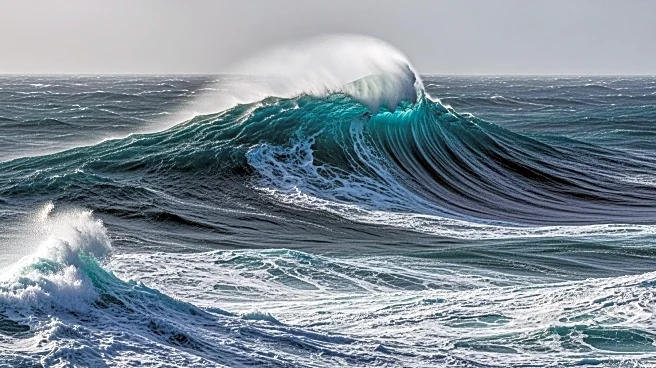What is the story about?
What's Happening?
Researchers from Georgia Tech, led by Francesco Fedele, have published a study in Nature's Scientific Reports that challenges long-standing theories about rogue waves. The study analyzed 27,500 wave records from the North Sea over 18 years, revealing that rogue waves are not anomalies but can be predicted through normal ocean dynamics. The research indicates that rogue waves result from the interaction of linear focusing and second-order bound nonlinearities, rather than modulational instability, which was previously thought to be the cause. This finding suggests that rogue waves follow natural ocean processes rather than being exceptions.
Why It's Important?
Understanding rogue wave formation is crucial for maritime safety, as these waves pose significant risks to ships and offshore structures. The study's findings could lead to improved forecasting models, enhancing the safety of navigation and the design of coastal and oil platform structures. By recognizing rogue waves as predictable events, stakeholders such as the National Oceanic and Atmospheric Administration and Chevron can better anticipate and mitigate the risks associated with these extreme ocean phenomena. This research underscores the importance of updating current models to reflect the predictable nature of rogue waves.
What's Next?
The research team is employing machine learning to analyze decades of wave data, aiming to develop algorithms that can detect the conditions leading to rogue waves. This approach seeks to provide forecasters with more accurate tools to predict when and where rogue waves might occur. The ongoing work could revolutionize how ocean risks are assessed and managed, potentially leading to more robust safety protocols and infrastructure designs that account for these powerful waves.
Beyond the Headlines
The study highlights the broader implications of understanding natural phenomena through scientific inquiry. By demystifying rogue waves, researchers are contributing to a deeper comprehension of ocean dynamics, which could have long-term impacts on environmental science and engineering. This knowledge not only aids in practical applications but also enriches the scientific community's understanding of the ocean's complex behavior.
















